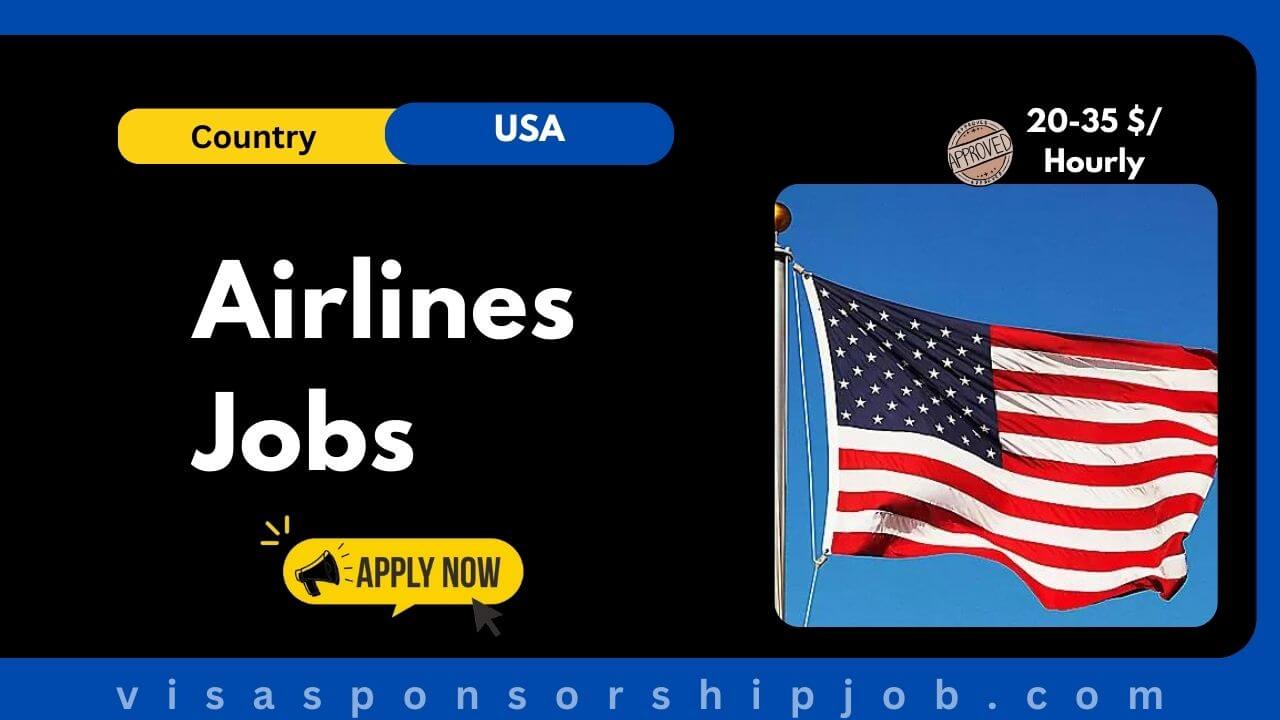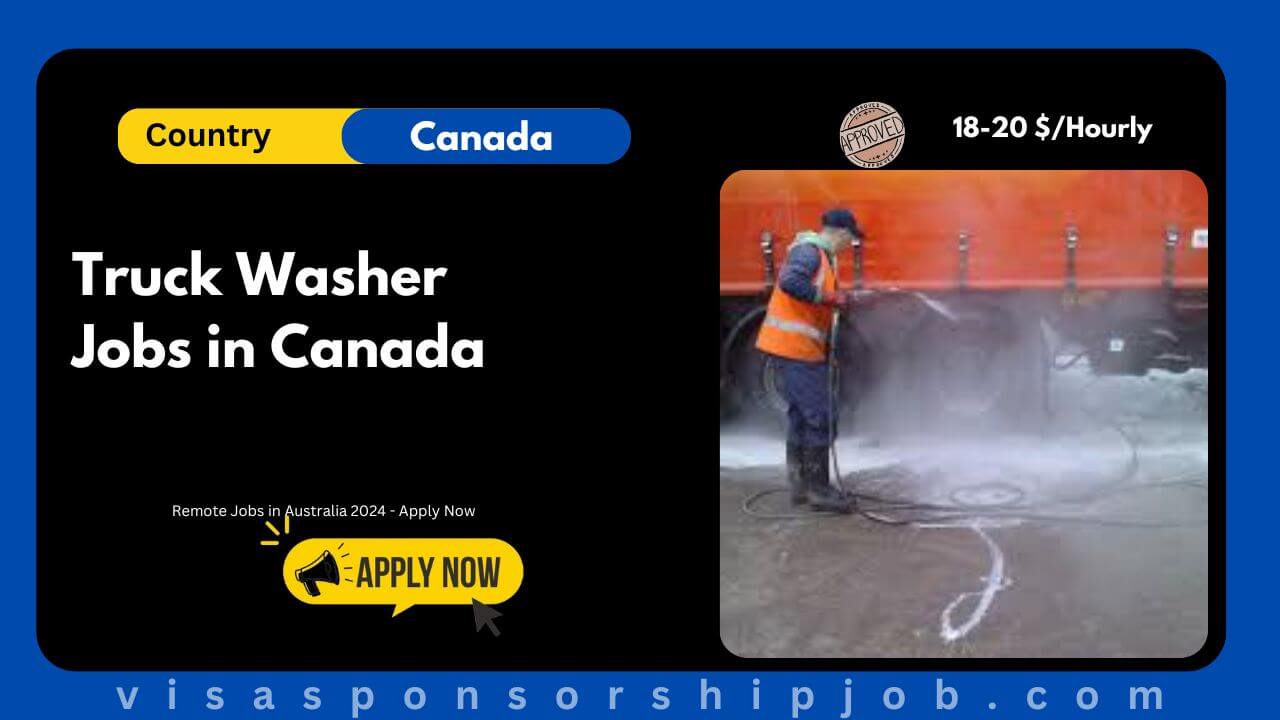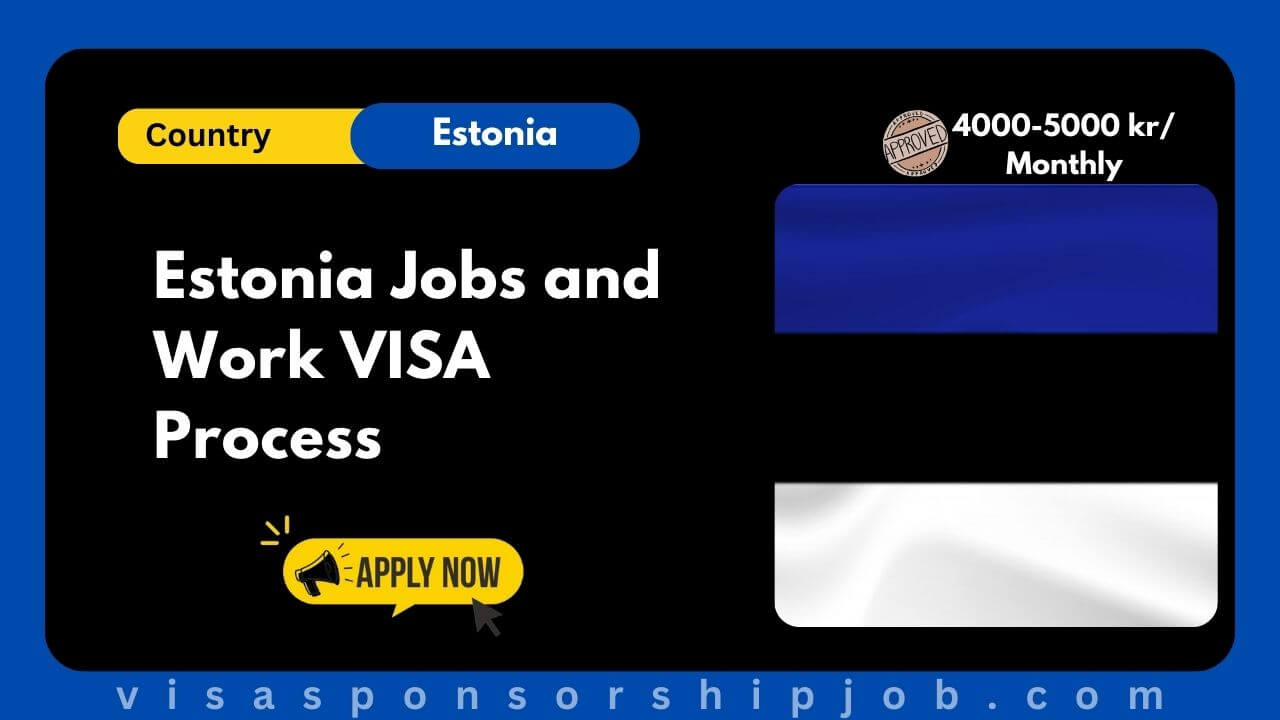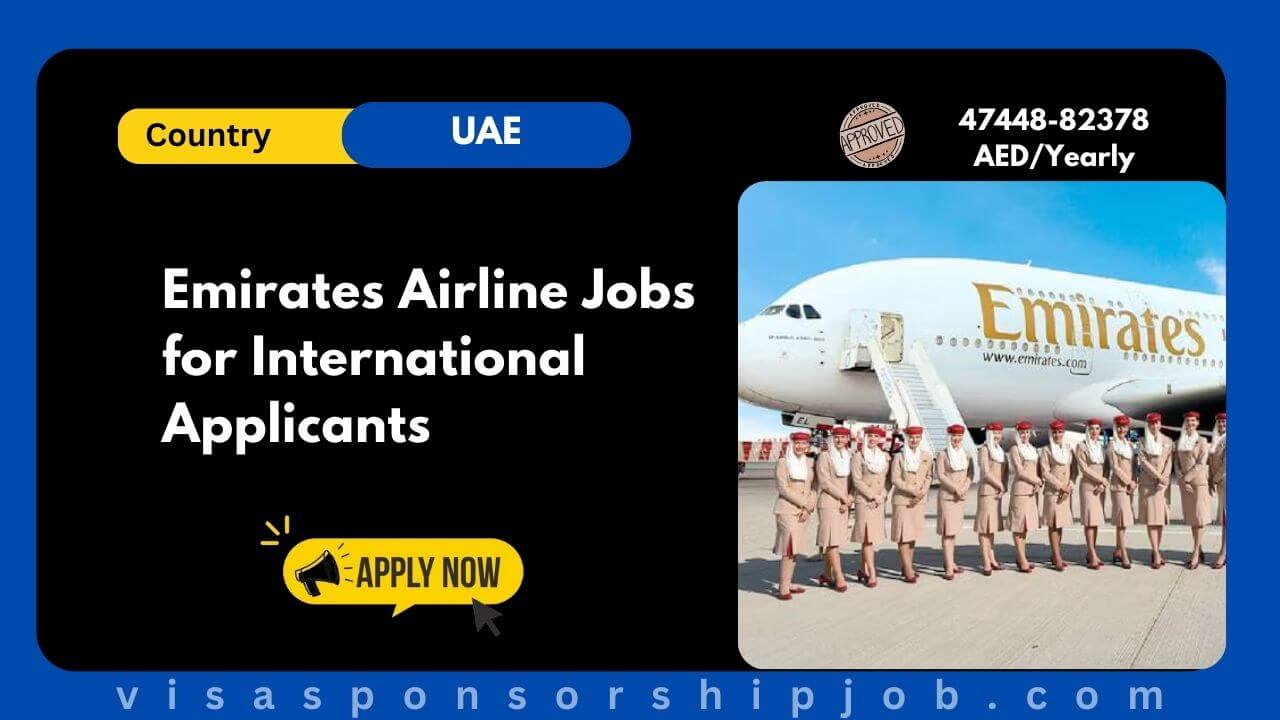Getting a job in the airline business might not be as hard as rocket science, but you do need to have the right credentials, relevant experience, and a real love for flying. If you have these qualities, doors to global airlines will open wide for you, inviting you to explore the many chances inside.
Discover the Airlines Jobs and Explore Salaries, Eligibility, and the Application Process for Exciting Career Opportunities in the Aviation Industry
In this comprehensive guide, we’ll delve into
- The Advantages and Disadvantages: Know both the good and bad things about working as a flight worker.
- Popular Job Roles and Eligibility: Learn about the most sought-after jobs and the qualifications they require.
- Top Airlines & Recruitment Portals: The list includes well-known airlines and straight links to their job pages.
- Essential Documents for Application: A list to make sure you’re ready to start your job as an airline worker
Introduction:
Are you thinking about working for an airline? Since the flight industry is steadily growing, there are a lot of job openings. This detailed guide will talk about all the different jobs that are out there, their pay, the requirements for getting them, and how to apply. The information in this piece will help you learn more about airline jobs, whether you want to fly planes or work on the ground.
Overview of the Airline Industry:
There are business airlines, cargo carriers, and private aviation companies in the airline industry, which is a very dynamic field. It is a key part of getting people and things around the world. The business is still getting back on its feet after the COVID-19 pandemic, which means there are many job openings.
Details of Airlines Jobs:
There are many great things about working for a foreign airline, like the chance to see a lot of the world, working with people from different cultures, getting paid well, and being able to pursue different career paths.
Sometimes, companies give their employees perks like cheap or even free trips, which lets them see more of the world. There’s no denying that these perks are appealing, but they may also come with problems, like working odd hours and having to travel all the time, which could make it hard to balance your personal and professional lives.
Also, the aviation industry is very competitive, which means that people who want to get high-paying jobs must have strong qualifications and work experience. Even with these problems, working in international aviation is still a fulfilling job that offers many chances to learn and grow as a person and as a worker. Now that you know all of this, if you still want to work for an international airline, keep reading this piece. It has everything you need to know about jobs in the airline industry.
Benefits Of Airlines Jobs:
- Travel Possibilities: The ability to travel frequently at reduced or no cost is one of the most appealing aspects of airline careers. This allows employees and their families to investigate new locales and cultures.
- Comparable Remuneration: Typically, airline jobs offer competitive compensation, which can vary based on the specific function and level of responsibility.
- Job Security: Due to the necessity of airlines for transportation, many airline positions are relatively stable, even during economic downturns. Government regulations and international treaties also contribute to the stability of employment.
- Comprehensive Advantages: Typical benefits packages for airline employees include health insurance, retirement programs, and travel-related perks.
- Employee Reductions: Numerous airline employees and their families travel at a discount or for free on their own airline and occasionally on partner airlines.
- Professional Progress: Airlines invest in their employees’ training and growth, providing opportunities for career advancement within the organization.
- Diverse Professions: The airline industry offers numerous career opportunities, including those for flight attendants, pilots, maintenance, engineers, customer service agents, and management positions. This diversity permits individuals to select careers that correspond to their talents and interests.
- Networking Possibilities: Airline jobs provide networking opportunities with professionals from a variety of disciplines, including aviation experts and business professionals.
- Cultural Contact: Working in the airline industry exposes employees to diverse cultures and individuals from all over the world, fostering a global outlook.
- Accommodations at a Discount: In addition to travel benefits, airline employees may be eligible for discounted hotel and resort accommodations.
- Pension Benefits: Numerous jobs in the airline industry include pension plans and retirement benefits, guaranteeing financial security in old age.
- On-the-Job Instruction: Frequently, airline employees receive role-specific training, such as safety procedures for flight personnel and technical training for maintenance staff.
- Employee Support Programs: Airlines may offer employee assistance programs to help with both personal and professional difficulties.
- Employee Reward and Recognition: Frequently, airlines have reward and recognition programs to recognize and motivate employees for exceptional performance.
- Satisfaction at Work: Numerous individuals find working in the airline industry personally satisfying, as it enables them to be a part of an industry that facilitates both business and leisure travel by connecting people and places.
List of Most Common Job Occupations at Airlines to Look for Jobs:
These are some of the most popular types of jobs that International Airways has open:
- Cabin Crew Jobs: The cabin crew team at International Airways is always looking for people who are friendly and excited to work there. The cabin crew is in charge of making sure that passengers on international planes are safe and comfortable.
- Pilots: International Airways is also looking for pilots with a lot of experience to join their team. Pilots are in charge of flying the fleet of Airbus and Boeing planes owned by International.
- Engineers: Engineers are needed by International Airways to keep its planes in good shape and fix problems. Engineers are also involved in making new technologies and planes.
- Ground Staff: There are a lot of people working on the ground for International Airways. They do many things, like check-in, handling bags, and helping customers.
- Corporate Jobs: It’s also possible to work for International Airways in business roles like finance, marketing, and human resources.
- Engineers jobs: International Airways hires many types of engineers, such as structural engineers, avionics engineers, aircraft repair engineers, and engine engineers.
- Baggage handler jobs: Baggage workers are in charge of putting and taking away bags from international planes. They also make sure that bags are correctly marked and sent to the right place.
- Flight dispatcher’s jobs: Flight dispatchers are in charge of planning and keeping an eye on international trips. They make sure that flights are safe and efficient and tell pilots about things like weather, airspace limits, and other important things.
- Flight marshal jobs: Flight marshals are in charge of making sure that international passengers and workers are safe. They are trained to spot security risks and take action, and they work closely with the pilots and cabin crew to make sure everyone on board is safe.
- CSR Jobs at Airlines: People who work in customer service are called CSRs. CSRs are in charge of helping international tourists with their needs. They help people with their travel needs, answer questions, and solve problems.
If you are interested in working for International Airways, you can read this article to view the eligibility criteria for these jobs available at all international airlines:
Eligibility Requirements for Jobs at Airlines:
If you want to work for a foreign airline, make sure you have the minimum qualifications for that job. For your convenience, I’ve listed the minimum qualifications for airline jobs below:
Cabin Crew Jobs Requirements:
- At least a high school education.
- If you speak more than one language well, that’s even better.
- Learning how to give first aid might be helpful.
- Passing the swimming test.
- There may be rules about age and height.
Pilots Jobs Requirements:
- You need either a Commercial Pilot License (CPL) or an Airline Transport Pilot License (ATPL).
- The CPL/IR is a commercial pilot license with an instrument rating.
- If needed, a type grade for an Airbus or Boeing plane
- At least 1,500 total flying hours are required (recommended).
- Rating for Multiple Engines (ME)
- Medical proof of fitness.
Engineers Jobs Requirements:
- Bachelor’s degree in engineering linked to aviation, mechanics, electricity, or something similar
- Certifications that are useful for building and maintaining aircraft
- Previous experience working on or fixing airplanes or making new technologies
Ground Staff Jobs Requirements:
- For entry-level jobs, you need a high school education or the equivalent.
- Having knowledge of customer service can be helpful.
- Customer service and talking to people well are skills.
- There is a lot of training for certain jobs, like check-in tools.
- Being able to write and speak English well.
Corporate Jobs Jobs Requirements:
- Three or more years of work in the field are required (preferred).
- A bachelor’s degree in one of the following areas is required:
- Finance: A bachelor’s degree in accounting, finance, or a related area.
- Marketing: A bachelor’s degree in business, marketing, or a related area.
- HR: Has a bachelor’s degree in business administration or human resources.
Engineers Jobs Jobs Requirements:
- For aircraft maintenance engineers, you need a bachelor’s degree in mechanical or aeronautical engineering and any related certifications.
- Avionics engineers need a degree in either electronics or avionics engineering.
- A degree in mechanical or aeronautical engineering is needed to be an engine engineer.
- Civil or aeronautical engineering is required for structural engineers.
Baggage Handler Jobs Requirements:
- At least a high school education.
- To lift and carry bags, you need to be physically fit.
- Being able to move and lift big things
- People may need to be taught how to use tools.
Flight Dispatchers Jobs Requirements:
- Valid license to send out flights
- Knowledge of the rules and tools for planning flights.
- At least three years of experience as a flight dispatcher are required.
Flight Marshalls Jobs:
- Security training is useful.
- It helps to have experience in law enforcement or security.
- Required: a valid flight marshal license
- Criteria for health and fitness.
CSR (Customer Service Representative):
- At least a high school education.
- Experience with customer service.
- Ability to talk to people and solve problems.
- Being able to work alone and with other people
- Knowing how to use the airline’s tools for booking and buying tickets
List of International Airlines Offering Jobs:
I looked into this list for you and it has the names of the world’s biggest international airlines. You can quickly search for job openings at these companies:
| Airlines | Country | Careers Websites to find Jobs Page of all Airlines |
| Air France | France | https://corporate.airfrance.com/en/careers |
| British Airways | United Kingdom | https://careers.ba.com/ |
| Lufthansa | Germany | https://www.lufthansagroup.careers/en.html |
| Emirates | United Arab Emirates | https://www.emiratesgroupcareers.com/ |
| Qatar Airways | Qatar | https://careers.qatarairways.com/ |
| Etihad Airways | United Arab Emirates | https://careers.etihad.com/ |
| Delta Air Lines | United States | https://delta.greatjob.net/ |
| American Airlines | United States | https://jobs.aa.com/ |
| United Airlines | United States | https://www.united.jobs/ |
| Air Canada | Canada | https://careers.aircanada.com/ |
| Cathay Pacific | Hong Kong | https://careers.cathaypacific.com/ |
| Singapore Airlines | Singapore | https://www.singaporeair.com/en_UK/us/careers/ |
| Qantas | Australia | https://www.qantas.com/au/en/about-us/careers.html |
| Air New Zealand | New Zealand | https://careers.airnz.co.nz/ |
| LATAM Airlines | Chile | https://www.latam.com/es_es/trabaja-con-nosotros/ |
| ANA (All Nippon Airways) | Japan | https://www.ana.co.jp/group/en/careers/ |
| Japan Airlines | Japan | https://www.jal.com/en/recruit/ |
| Korean Air | South Korea | http://recruit.koreanair.com/ |
| Turkish Airlines | Turkey | https://www.turkishairlines.com/en-int/career/ |
| Aeroflot | Russia | https://www.aeroflotgroup.ru/en/career |
| Swiss International Air Lines | Switzerland | https://www.swiss.com/corporate/EN/careers |
| KLM (Royal Dutch Airlines) | Netherlands | https://careers.klm.com/ |
| Iberia | Spain | https://www.iberia.com/es/employment/ |
| Alitalia | Italy | http://corporate.alitalia.it/en/careers/careers.html |
| Scandinavian Airlines (SAS) | Sweden/Denmark/Norway | https://www.sasgroup.net/en/career/ |
| Finnair | Finland | https://careers.finnair.com/ |
| Aer Lingus | Ireland | https://careers.aerlingus.com/ |
| TAP Air Portugal | Portugal | https://www.flytap.com/en-pt/careers |
| China Southern Airlines | China | https://careers.csair.com/ |
| China Eastern Airlines | China | https://hr.ceair.com/ |
| Air India | India | http://www.airindia.in/careers.htm |
| IndiGo | India | https://careers.goindigo.in/ |
| Thai Airways | Thailand | https://career.thaiairways.com/ |
| Malaysia Airlines | Malaysia | https://www.malaysiaairlines.com/hq/en/about-us/career.html |
| Garuda Indonesia | Indonesia | https://career.garuda-indonesia.com/ |
| Philippine Airlines | Philippines | https://www.philippineairlines.com/AboutUs/Careers/HomePage |
| Vietnam Airlines | Vietnam | https://recruitment.vietnamairlines.com/ |
| South African Airways | South Africa | https://www.flysaa.com/about-us/careers |
| EgyptAir | Egypt | http://www.egyptair.com/en/about/Pages/job-requirements.aspx |
| Royal Air Maroc | Morocco | https://www.royalairmaroc.com/int-en/careers |
| Kenya Airways | Kenya | https://www.kenya-airways.com/global/About_Kenya_Airways/Careers/Careers/ |
| Ethiopian Airlines | Ethiopia | https://www.ethiopianairlines.com/corporate/career |
| Gulf Air | Bahrain | https://careers.gulfair.com/ |
| Saudia | Saudi Arabia | https://careers.saudia.com/ |
| Oman Air | Oman | https://careers.omanair.com/ |
| Kuwait Airways | Kuwait | https://www.kuwaitairways.com/en/careers |
| El Al Israel Airlines | Israel | https://www.elal.com/en/About-ELAL/Careers/Pages/default.aspx |
| MEA (Middle East Airlines) | Lebanon | https://www.mea.com.lb/english/careers |
| PIA (Pakistan International) | Pakistan | https://www.piac.com.pk/careers |
| SriLankan Airlines | Sri Lanka | https://www.srilankan.com/careers |
| Bangladesh Biman | Bangladesh | https://www.biman-airlines.com/about/career |
| Royal Jordanian | Jordan | https://www.rj.com/en/careers-at-rj |
| Azul Brazilian Airlines | Brazil | https://www.voeazul.com.br/en/careers |
| Aeroméxico | Mexico | https://aeromexico.com/es-mx/empleo-aeromexico |
| Avianca | Colombia | https://www.avianca.com/otr/en/about-us/employment/ |
| Caribbean Airlines | Trinidad and Tobago | https://www.caribbean-airlines.com/#/about-us/careers |
Kindly keep in mind that International Airways workers make different amounts of money based on their experience, location, and job title. International Airways, on the other hand, is known for giving its workers good benefits and pay.
Read Also: Emirates Airline Jobs for International Applicants
What do you need to apply for a job at Airline?
Applying for a job at an international airline is a lot like applying for jobs in other fields. However, because of the nature of the aviation industry, there are some requirements and papers that are usually needed. If you want to work for an overseas airline, here is a general list of what you might need:
- Resume/CV: This should list your schooling, work history, skills, and any certifications you have. It should be tailored to the job you’re looking for.
- Cover Letter: A personalized letter telling the company and the job opening that you’re interested in and giving reasons why you’re a good fit.
- References: Some companies might ask for references from people who have worked for you before or who can speak for your character and skills.
- Proof of Education: This could be a certificate, a degree, or a certification that is useful. For instance, pilots would have to give information about their licenses to fly.
- Professional Certifications: Depending on the job, you might need to show proof of your credentials. As an example, airplane engineers would have to show their licenses to do repairs.
- Medical Certificate: A certain type of aircraft medical certificate is needed for some jobs, like pilots and cabin crew.
- Criminal Background Check: Because jobs in the airline industry are delicate, most of them do background checks to make sure that passengers and crew are safe.
- Passport and/or Work Visa: If you are applying from outside of the United States for an overseas job, you may need a valid passport and a work visa for the airline’s home country.
- Photos: Some airlines want passport-sized pictures to be sent with the application, especially for jobs where you’ll be dealing with customers, like cabin crew.
- Proof of Language Proficiency: If the job calls for expertise in a certain language, like English for pilots, you may need to show proof that you can speak and write that language well.
- Logbook: Pilots need to keep a logbook that records their flying hours, the kinds of planes they’ve flown, and any other relevant experience.
- Pilots: Type ratings for specific aircraft, simulator check reports, and additional licenses.
- Cabin Crew: Certifications from earlier airline training, and the ability to swim (this is required by some airlines).
- Engineers: Certifications for specific types of aircraft or systems.
- Application Form: For some flights, you need to fill out a certain application form, which you can do online or on paper.
- Driver’s License: For some jobs, you may have to drive cars on the runway or in other parts of an airport.
Conclusion:
Finally, if you want to work in the airline industry, you can find a lot of interesting jobs in a variety of fields, whether you love flying, engineering, customer service, or corporate functions. There are pros and cons to this business. The chance to travel around the world and make good money are two pros, but the difficult schedules and time spent away from home are also things to think about.
As the aircraft industry continues to recover from the effects of the COVID-19 pandemic, there are a lot of job openings in a lot of different areas of the industry. As someone who wants to work for an airline, it’s important to know what you need to do to be considered for the job you want. Usually, these include school requirements, certifications, language skills, and other job-specific requirements.
There are a lot of job choices for you because well-known international airlines offer a wide range of jobs, from cabin crew to pilots, engineers, ground staff, and corporate roles. The pay and benefits at these airlines are reasonable, which makes them a good choice for people looking for work.
To apply for a job in the airline business, you’ll need to have your resume, cover letter, references, medical certificates, proof of education and certifications, and a passport or work visa if you are applying from outside of the United States. Because the standards may be different for each job, it’s important to read through each airline’s application process carefully.
Overall, working in the airline business can be fun and rewarding. You can see the world while making a difference in a very important global transportation system. It is possible to have a fulfilling and financially rewarding job in aviation if you meet the requirements and really love the subject.
Frequently Asked Questions:
What are the pros and cons of working in the airline industry?
Pros include the chance to work with people from different cultures, travel the world, make good money, and advance in your job. Cons, on the other hand, might include odd hours, a lot of travel, and trouble handling work and personal life.
What are the most common job occupations in the airline industry?
People who work as cabin crew, pilots, engineers, ground staff, business roles (like finance, marketing, and HR), baggage handlers, flight dispatchers, flight marshals, and customer service representatives (CSRs) all have common jobs.
What are the eligibility requirements for different airline jobs?
Different jobs have different requirements, but some of them are educational requirements, certifications, language skills, medical certificates, background checks, and job-related requirements like flight hours for pilots and engineering standards for engineers.






